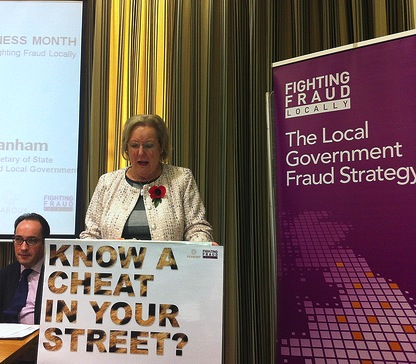 Benefit recipients are often portrayed negatively by politicians and the media. But if ‘balancing the books’ is the government’s primary aim, demonising specific groups is unlikely to be productive. David Binder suggests increasing the housing supply, introducing rent controls and looking into ways to boost incomes to reduce the need for tax credits would be a more effective approach.
Benefit recipients are often portrayed negatively by politicians and the media. But if ‘balancing the books’ is the government’s primary aim, demonising specific groups is unlikely to be productive. David Binder suggests increasing the housing supply, introducing rent controls and looking into ways to boost incomes to reduce the need for tax credits would be a more effective approach.
Like the New Labour government before it, the coalition government wants to go after benefit cheats who scam the state out of taxpayer funded social security payments. This is unsurprising given chancellor George Osborne’s recent proclamation that he wants to swipe another £12 billion from the current welfare budget.

According to the Department for Work and Pensions, welfare fraud costs the taxpayer some £1.2 billion per year. This sounds like a big number, and in many ways it is. Few would argue that it is morally justifiable for people to claim benefits they are not eligible for, and that offenders should be accordingly dealt with by the authorities. Whilst there’s a worthwhile debate to be had regarding why people fraudulently claim and what should be done with them, it’s interesting to consider how this £1.2 billion figure stacks up in comparison to other tax and benefit related illegal behaviour.
Take tax evasion as one example (we’ll leave tax avoidance as this is technically legal, whatever you might think of the ethics of such behaviour). This wholly illegal measure cost the Treasury £5.1 billion in 2011/12 (the latest year for which data is available). So, although the Government have announced action on tackling tax evasion, it has hardly done so with the same fanfare as it has with its benefit fraud campaign.
Those who claim benefits are often portrayed negatively by politicians, media and some members of the general pubic which in turn influences attitudes toward benefit claimants from the general public. Consider, for instance, figures that suggest the public believes that £24 out of every £100 spent on benefits is lost through fraud. What’s the actual figure? 70 pence. Given this disparity, the prevailing attitudes towards welfare claimants are perhaps not surprising. In addition, even in the very best scenario (when the entire £1.2 billion fraud estimate is completely plugged, which it almost certainly never will be) claiming back costs relating to benefit fraud would only make a slight dent in George Osborne’s £12 billion figure.
As it happens, the Chancellor has indicated that he wants the cuts to primarily come from wealthy council house tenants and under 25’s claiming housing benefit. I’d be interested to hear more on Osborne’s reasoning for particularly targeting these benefits and not looking at other benefits such as those relating to pensions. It’s important we consider this segment of welfare expenditure when it comes to the debate on welfare because state pensions by far that take up the largest proportion of the overall welfare budget at £74.22 billion per year. By comparison, housing benefit and disability allowance take up £16.94 billion and £12.57 billion per year respectively.
This is when things become difficult because despite spending on state pensions taking up a huge proportion of the welfare budget, I’m confident very few of us would call the state pension overly generous (it’s among the worst in the OECD). Indeed, the key reason why the spend is so high is because of the high numbers of pensioners themselves and the fact they are living longer than ever before. We’re therefore left with something of a ‘sticky wicket’: spending such as housing benefit and job seeker’s allowance takes up a relatively small part of the welfare budget, but cutting the state pension would arguably penalise some of the poorest pensioners, not to mention those who have worked all their lives paying National Insurance contributions expecting to receive an adequate pension in their retirement. In any case, although the government have tentatively considered cutting other universal state benefits for wealthy pensioners, such as free bus passes and winter fuel payments, these benefits are both relatively modest (costing the taxpayer £1 billion and £2.15 billion respectively) I’d wager that the government would be reluctant to heavily reduce these benefits due to a) pensioners being more likely to vote than any other age group, and b) pensioners being more likely to vote Conservative.
At the end of the day, in order to ‘balance the books’ I’d consider doing three things. Firstly, I’d think about implementing a large affordable house building programme or radically reform planning laws so that supply would increase, meaning hopefully, pay outs to fund housing benefit would be less (due to rents decreasing, or at least not increasing as rapidly as they have been of late). Secondly, I’d consider introducing rent controls, which again would stem the rise in housing benefit pay outs. Thirdly, I’d seriously look at the system of tax credits, which currently costs the taxpayer some £27.2 billion per year. The reason tax credit spending is so high is because of low salaries (or what some call ‘poverty’ wages). That is, tax credits subsidise low wages by effectively ‘topping them up’ so households have an adequate income, in theory. This spend could be curbed by enforcing a higher minimum wage (as Osborne has recently announced) or better still a living wage. In addition, financial recognition of family responsibility could be moved into the tax system, for example, by reintroducing child tax allowances. Doing these things would both reduce the tax credit spend by removing more people from tax credits and from the frankly pitiful work incentives that exist for many families under tax credits.
However, the measures suggested here are more long term in nature than might be desired for this government. Yet long term solutions are needed to seriously tackle problems relating to public spending. Thus, whilst focusing on benefit fraud, housing benefit for the under 25s and wealthy council house tenants might be popular with certain sections of the electorate, doing so ignores wider problems with our welfare system as it currently stands.
Note: This article gives the views of the author, and not the position of the British Politics and Policy blog, nor of the London School of Economics. Please read our comments policy before posting.
About the Author
 David Binder is a Family Fiscal policy Consultant for the Christian social policy charity, CARE, where he conducts in- depth research on Family Tax, Welfare and Benefits. As well as also writing extensively on these issues, David explores other areas relating to society and culture, evangelical christianity (of which he is a believer) and criminal justice. David’s blog can be read at www.thoughtsofbinder.wordpress.com.
David Binder is a Family Fiscal policy Consultant for the Christian social policy charity, CARE, where he conducts in- depth research on Family Tax, Welfare and Benefits. As well as also writing extensively on these issues, David explores other areas relating to society and culture, evangelical christianity (of which he is a believer) and criminal justice. David’s blog can be read at www.thoughtsofbinder.wordpress.com.








The figure of around £1 Billion lost of supposed ‘benefit fraud’ has remained static for at least the past 8 years – despite spending £34,459356 on campaigns to catch the offenders. am I the only person that finds this strange? For a full account please visit http://jaynelinney.wordpress.com/2014/02/06/the-real-agenda-behind-benefit-fraud-campaigns-with-spending/
All the above objectives require innovative minds to Inspire Attitudes, Policy Development and Positive Outcomes. This has been the missing link throughout the recession – hence, the political language has referred to ‘skivers’ rather than talking about new and refreshing ways in which to motivate people amid failings they have incurred in a recession – which is no doubt wrong.
I am amazed at even the thought of ‘chasing benefit cheats’ while CEO bankers who failed banks and gladly took the financial rewards of such a failure – are still FREE – not arrested, placed on trial and imprisoned. Politicians cannot have it both ways. Politicians cannot claim that we live in a Democracy when it suits only their argument, but then – in the vast cases where Fairness and Justice is itself put on trial to acknowledge where the balance sits – then only focus on the most challenged groups in our society. Yes, Fraud is wrong. But, politician’s words and actions only express that it is wrong when a vulnerable individual or group engages in such activities – not when it is clear that CEO banker’s failing of banks do so. So, this is the political message.. loud and clear, many will say.
Yes, housing and incomes? Let’s talk about achieving Upwards Social Mobility. Let’s talk about our politicians going into the heart of our communities and MOTIVATING those who have been failed, but who remain ambitious and determined to support the goals of our younger generation. If we are to stop the cycle of non-working parents, we also need to fully understand the reason why this has happened – as its negative influence is clear on many young boys today.
So, where do I sign-up to play that supportive role?